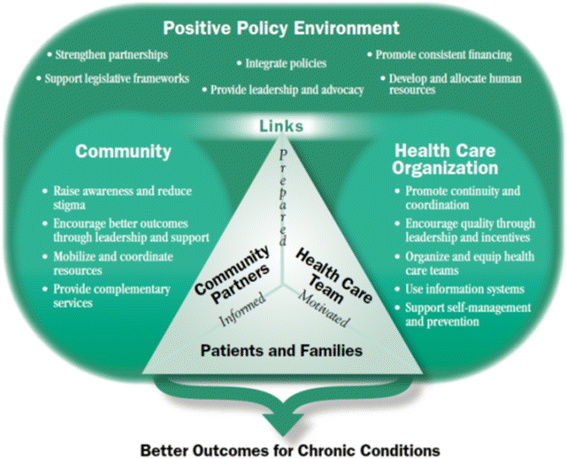"I don't have options but to persevere." Experiences and practices of care for HIV and diabetes in rural Tanzania: a qualitative study of patients and family caregivers
- PMID: 27038911
- PMCID: PMC4818906
- DOI: 10.1186/s12939-016-0345-5
"I don't have options but to persevere." Experiences and practices of care for HIV and diabetes in rural Tanzania: a qualitative study of patients and family caregivers
Abstract
Background: The high prevalence of chronic diseases in Tanzania is putting a strain on the already stretched health care services, patients and their families. This study sought to find out how health care for diabetes and HIV is perceived, practiced and experienced by patients and family caregivers, to inform strategies to improve continuity of care.
Methods: Thirty two in-depth interviews were conducted among 19 patients (10 HIV, 9 diabetes) and 13 family caregivers (6 HIV, 7 diabetes). Diabetes patients and caregivers were accessed through one referral facility. HIV patients and caregivers were accessed through HIV clinics at the district hospital, one health centre and one dispensary respectively. The innovative care for chronic conditions framework informed the study design. Data was analysed with the help of Nvivo 10.
Results: Three major themes emerged; preparedness and practices in care, health care at health facilities and community support in care for HIV and diabetes. In preparedness and practices, HIV patients and caregivers knew more about aspects of HIV than did diabetes patients and caregivers on diabetes aspects. Continued education on care for the conditions was better structured for HIV than diabetes. On care at facilities, HIV and diabetes patients reported that they appreciated familiarity with providers, warm reception, gentle correction of mistakes and privacy during care. HIV services were free of charge at all levels. Costs involved in seeking services resulted in some diabetes patients to not keep appointments. There was limited community support for care of diabetes patients. Community support for HIV care was through community health workers, patient groups, and village leaders.
Conclusion: Diabetes and HIV have socio-cultural and economic implications for patients and their families. The HIV programme is successfully using decentralization of health services, task shifting and CHWs to address these implications. For diabetes and NCDs, decentralization and task shifting are also important and, strengthening of community involvement is warranted for continuity of care and patient centeredness in care. While considering differences between HIV and diabetes, we have shown that Tanzania's rich experiences in community involvement in health can be leveraged for care and treatment of diabetes and other NCDs.
Keywords: Access; Chronic care; Community care; Diabetes; HIV; Sub Saharan Africa; Tanzania.
Figures
Similar articles
-
Perceptions on diabetes care provision among health providers in rural Tanzania: a qualitative study.Health Policy Plan. 2017 Apr 1;32(3):418-429. doi: 10.1093/heapol/czw143. Health Policy Plan. 2017. PMID: 27935802 Free PMC article.
-
The acceptability of integrated healthcare services for HIV and non-communicable diseases: experiences from patients and healthcare workers in Tanzania.BMC Health Serv Res. 2022 May 16;22(1):655. doi: 10.1186/s12913-022-08065-4. BMC Health Serv Res. 2022. PMID: 35578274 Free PMC article.
-
"In a situation of rescuing life": meanings given to diabetes symptoms and care-seeking practices among adults in Southeastern Tanzania: a qualitative inquiry.BMC Public Health. 2015 Mar 7;15:224. doi: 10.1186/s12889-015-1504-0. BMC Public Health. 2015. PMID: 25886626 Free PMC article.
-
Community perceptions and experiences on the events leading to facility maternal death; a verbal autopsy qualitative study.Sex Reprod Healthc. 2023 Jun;36:100851. doi: 10.1016/j.srhc.2023.100851. Epub 2023 Apr 20. Sex Reprod Healthc. 2023. PMID: 37126964 Review.
-
Strengthening Services for Most Vulnerable Children Through Quality Improvement Approaches in a Community Setting: The Case of Bagamoyo District, Tanzania.2020 May 27. In: Marquez LR, editor. Improving Health Care in Low- and Middle-Income Countries: A Case Book [Internet]. Cham (CH): Springer; 2020. Chapter 10. 2020 May 27. In: Marquez LR, editor. Improving Health Care in Low- and Middle-Income Countries: A Case Book [Internet]. Cham (CH): Springer; 2020. Chapter 10. PMID: 33347257 Free Books & Documents. Review.
Cited by
-
Experiences of people living with HIV in low- and middle-income countries and their perspectives in self-management: a meta-synthesis.AIDS Res Ther. 2024 Jan 31;21(1):7. doi: 10.1186/s12981-024-00595-7. AIDS Res Ther. 2024. PMID: 38297363 Free PMC article. Review.
-
Exploring the preferred integration approach for HIV, diabetes and hypertension care and associated barriers and facilitators in Central Tanzania: An exploratory qualitative study.PLOS Glob Public Health. 2024 Jul 24;4(7):e0003510. doi: 10.1371/journal.pgph.0003510. eCollection 2024. PLOS Glob Public Health. 2024. PMID: 39046965 Free PMC article.
-
'What kind of life is this?' Diabetes related notions of wellbeing among adults in eastern Uganda and implications for mitigating future chronic disease risk.BMC Public Health. 2018 Dec 27;18(1):1409. doi: 10.1186/s12889-018-6249-0. BMC Public Health. 2018. PMID: 30587168 Free PMC article.
-
Qualitative Research Methods in Chronic Disease: Introduction and Opportunities to Promote Health Equity.Annu Rev Public Health. 2022 Apr 5;43:37-57. doi: 10.1146/annurev-publhealth-012420-105104. Epub 2021 Dec 22. Annu Rev Public Health. 2022. PMID: 34936827 Free PMC article. Review.
-
Patient's experiences of diabetes care at a tertiary health facility in Lilongwe, Malawi.BMC Health Serv Res. 2023 Oct 12;23(1):1093. doi: 10.1186/s12913-023-10039-z. BMC Health Serv Res. 2023. PMID: 37828591 Free PMC article.
References
-
- NCD country profile: Tanzania [http://www.who.int/nmh/countries/tza_en.pdf]
-
- HIV and AIDS Estimates 2013: Tanzania [http://www.unaids.org/en/regionscountries/countries/unitedrepublicoftanz...]
-
- Atun R, Jaffar S, Nishtar S, Knaul FM, Barreto ML, Nyirenda M, Banatvala N, Piot P. Improving responsiveness of health systems to non-communicable diseases. Lancet. 2013;381(9867):690–7. - PubMed
-
- IDF Diabetes Atlas Sixth Edition 2014 update: Tanzania Profile [http://www.idf.org/sites/default/files/Atlas-poster-2014_EN.pdf]
-
- TACAIDS ZACZ, National Bureau ofStatistics (NBS), Office of the Chief Government Statistician (OCGS), and ICF International . Tanzania HIV/AIDS and Malaria Indicator Survey 2011–12. Dar es Salaam, Tanzania: TACAIDS, ZAC, NBS, OCGS, and ICF International; 2013.
Publication types
MeSH terms
LinkOut - more resources
Full Text Sources
Other Literature Sources
Medical


